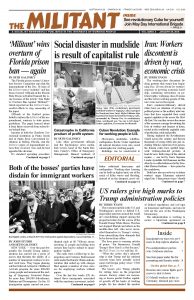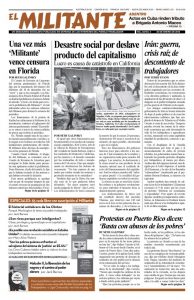Extensive working-class discontent with rising prices, unemployment and both major factions of the government led to protest actions over several days in some 20 cities and towns across Tunisia beginning Jan. 7.
The government increased the price of fuel and some food items, raised workers’ social security contributions and hiked taxes on phone cards, internet usage and cars Jan. 1. For wide layers of the working class, already fighting to make ends meet, the onerous measures impose even greater difficulties.
Tunisia is touted in the bourgeois press as the one country to emerge with a degree of “stability” from the Arab Spring uprisings that swept parts of the Middle East and North Africa. But Tunisia has, in fact, had nine governments since the 2011 mass uprising that overthrew the hated Ben Ali dictatorship, and depression conditions continue to stalk working people. While inflation currently runs at 6 percent, food prices have gone up 50 percent since then.
Youth unemployment remains at 25 percent. And young people are a large component of the rising proportion of workers — estimated at over one-third of the workforce — employed in what is called the informal economy, with no contract, no assurance of work, nor access to health care or social security.
Toilers who live in the country’s less-populated interior face far fewer jobs and the worst conditions.
“It is impossible for people to live with dignity today,” Wael Naouar, a protester, told the New York Times Jan. 9.
“This government, like every government after Ben Ali, only gives promises and has done nothing. People are angry and poverty is rising,” Imen Mhamdi, a factory worker, told Al-Jazeera at a demonstration in Sousse.
In response to the protests, Finance Minister Ridha Chalghoum extolled “the achievements of democracy,” and “the ability to organize and protest,” while defending the government’s attacks that pile more hardships on the working class. At the same time, authorities unleashed cops and tear gas on protesters and arrested over 700 people, including three officials of the opposition Popular Front Party.
The government in November extended a state of emergency — in place since Islamist terror attacks in 2015 — giving the cops the power to ban strikes and prevent public protests. On Jan. 10 it deployed the army against protesters in several cities, including Thala, a town of 16,000 in the northeast. Hours earlier cops had fled the town and demonstrators torched the national security offices.
Acting in the interests of the wealthy bondholders, the International Monetary Fund delayed payment of part of a promised $2.6 billion loan to Tunisia last year, pressing the government to cut spending by firing public sector workers.

